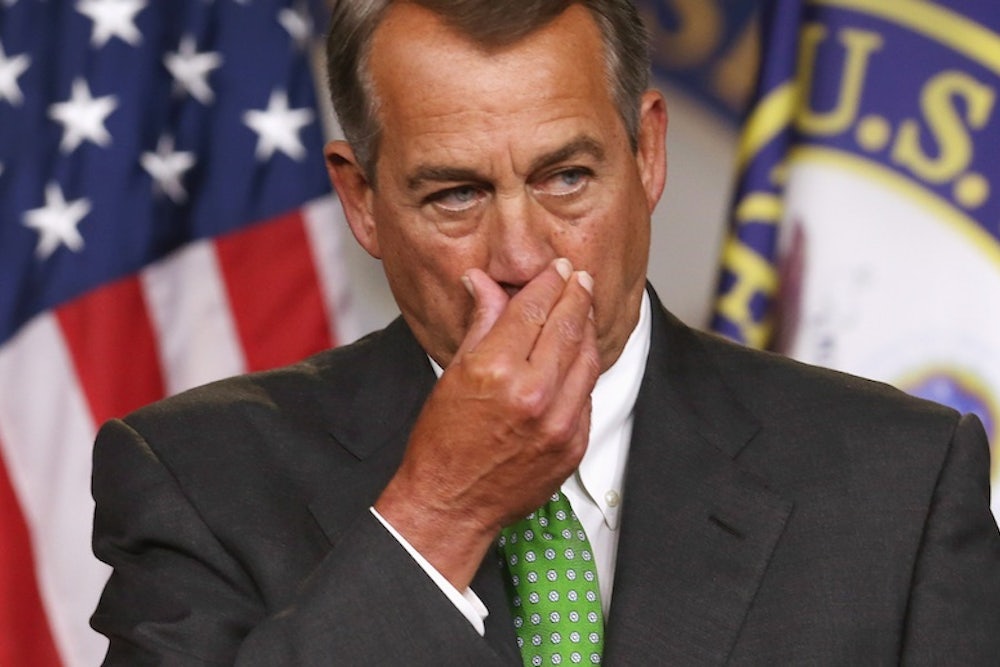The first transmission of Ebola within the United States, from Liberian visitor Thomas Eric Duncan to a Dallas nurse, marked a turning point in the political dialogue surrounding the virus toward an unbridled opportunism. The subsequent diagnosis of a second nurse and other revelations—that she took a flight shortly before she began showing symptoms, apparently with Centers for Disease Control's approval—have only accelerated it. Obviously a degree of paranoia and sensationalism has colored the Ebola story since long before this week. But this week’s developments provided conservatives the psychological ammunition they needed to justify using the specter of a major Ebola outbreak as an election-year base-mobilization strategy.
Republican candidates like Scott Brown are now in on the game, and so is House Speaker John Boehner. Fox News, with the exception of Shepard Smith, is ginning up more Ebola terror than CNN, which had been the vanguard of Ebola hysteria until this week. Matt Drudge’s call to panic was not only deranged—
self-quarantine
— MATT DRUDGE (@DRUDGE) October 15, 2014—but unintentionally self-defeating, as one cannot vote if one is self-quarantined.
Engaging in the politics of fear requires a pretense. You can find people who hype mortal danger, without a sheen of plausibility, shouting into bullhorns on street corners. Politicians and their enablers need persuasive stories that make the threats sound real. And the story that many conservatives are telling about Ebola goes something like this: We'd love to eschew hysteria, and we’d love to believe our public health officials can break the chain of transmission within the U.S., but the Obama administration has proven itself untrustworthy.
“This is an episode when people want to trust the government, people need to trust the government and they can’t,” columnist George Will intoned on Fox News earlier this month. “What was happening exactly 12 months ago? A government shutdown and the disastrous rollout of Healthcare.gov. Since then we’ve had intelligence failures regarding ISIS; we’ve had the debacle of the veterans handling of healthcare; and the Secret Service that couldn’t lock the front door of the White House. So people think this is a gang that can’t shoot straight.”
University of Tennessee law professor Glenn Reynolds repackaged Will’s basic argument in USA Today on Monday. Among those he cited was "Meet the Press" host Chuck Todd, who added lost IRS emails, Edward Snowden's NSA disclosures, and the child-migrant crisis to the litany. Members of the media are enabling this opportunism. They should be anathematizing it.
The competence argument is appealing because it doesn’t require dabbling in pseudoscience or xenophobia—just healthy skepticism of our governing institutions. Moreover, I’m certain this sort of skepticism does help explain why a large minority of people in the U.S. feels at risk of contracting Ebola. But they are at no great risk. That the risk is provably infinitesimal underscores the fact that the issue with Ebola isn’t the virus itself so much as paranoia about it.

Even if each of the failures and crises enumerated above were as unambiguous and damning as the administration's critics claim, it doesn’t follow that federal health officials aren’t up to the task of controlling Ebola, or that the public at large faces any meaningful risk. It might follow that we shouldn’t believe this season’s Affordable Care Act enrollment period will be glitch-free, and that the Vetrerans Affairs’s problems won’t be solved with new management alone. The point is not that we should never draw inferences from this administration's previous failings. But it’s a fallacy to arbitrarily extend that second-guessing to the Ebola containment effort, while at the same time happily taking it for granted that the vast majority of things we entrust the government to do will continue apace.
Ebola carries a crucial mix of novelty, visibility, and lethality that ripens it for demagogy. But conservatives have selected a familiar line of demagogy—that you can't trust the government to administer things and solve problems—and imposed it on to a situation where stoking reflexive distrust of the government tugs at the lid of a big Pandora's box.
The sad irony is that state and local institutions, so beloved on the right, were apparently out to sea when Ebola arrived in Dallas, and health officials there would have let things drift further into chaos had the federal government not intruded further. Not that they've performed flawlessly, but we need more of their expertise and involvement, not less. Texas Governor Rick Perry—who in gentler times plays footsie with secession—is grateful for this intrusion, and has “great faith” that their efforts will succeed. Perhaps he’ll surprise us further by dismissing the idea that the federal officials who’ve stepped up against Ebola shouldn't be trusted because about a year ago, some federal healthcare website was beset by glitches.
